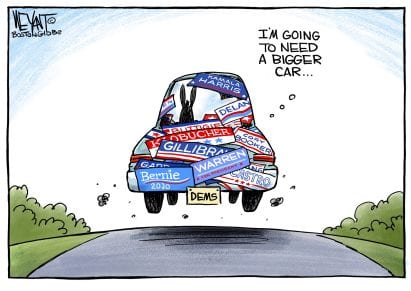BY SUSAN ESTRICH
 If you believe the national polls, Joe Biden is running first nationally [in three of four polls out this week], about eight points ahead of Sen. Bernie Sanders, which tells you nothing about how things will look after Iowa.
If you believe the national polls, Joe Biden is running first nationally [in three of four polls out this week], about eight points ahead of Sen. Bernie Sanders, which tells you nothing about how things will look after Iowa.
If you believe the prediction numbers, the chances of a second Trump term have gone from likely to very likely. No one who people want to bet on against Trump has “emerged.”
If you believe the headlines, the openly gay mayor of South Bend, IN, is surging, which is to say he’s still in the mid-single digits. But he’s on the ground; he has seduced the press; and he’s building an organization.
Iowa is for underdogs. The system was set up that way. If the best candidate were the one who’s ahead in the national polls, then we’d have a national primary in each party, where as many people as possible vote. If we were to want a system that favors establishment moderates even more, we’d make that an open primary, with the top two finishers competing for president.
Iowa is for activists. New Hampshire is “hardcore.” The activist ideologues who provide the lifeblood at both ends of the political spectrum like it that way. I certainly did when I was a young activist writing the rules.
Iowa is the place where a virtually unknown and unheralded one-term governor from Georgia going from town to town introducing himself ended up beating all the establishment politicians [actually, Jimmy Carter finished second to uncommitted] and getting elected president.
Iowa was where former Vice President Walter Mondale stumbled in what was supposed to be a done deal, suggesting weaknesses that foreshadowed his defeat.
Iowa was where Barack Obama, then a first-term senator from Illinois, defeated then much-favored Hillary Clinton. A brilliant candidate emerged from that campaign.
And Iowa was where Sen. Bernie Sanders triumphed and Clinton stumbled [which is to say, they tied], a stumble that paved the way for a long and difficult campaign.
Sanders is an Iowa candidate. Among other advantages, he’s done it before. To vote in Iowa, you literally need to go out on a cold winter night and listen to a bunch of speakers and then go to different corners of the room and start counting. To win in Iowa, you’ve got to get your feet on the ground and into the living rooms of activists across the state. You can’t sound like you’re reading from a briefing book. In Iowa, voters actually expect to see candidates. We used to laugh when the answer to “Have you met Candidate X?” was “only once.” Only once. That’s Iowa.
The problem is that winning Iowa doesn’t mean you can win nationally, and losing Iowa doesn’t mean you can’t. But the likelihood of ending up as the nominee is very much shaped by Iowa. A front-runner wins very little by winning Iowa; but a front-runner who loses Iowa is in a race for his or her political life.
For years, the Democratic Party tried to get rid of Iowa and New Hampshire. There were rules on the table to not count their delegates. The governors showed up for the big Democratic National Committee meeting. So did all the would-be candidates, who, of course, promised that whether it “counted” or not, they would be competing in Iowa and New Hampshire. This competition is not measured by delegates, whether they are seated at a convention or not.
As for predictions, while those poll numbers don’t tell you much about who’s likely to win, they do set some expectations, and expectations are what Iowa is ultimately about.
If you’re expected to win because you were vice president [Biden] or because you went for it before and you finished second [Sanders], you’re wounded but not dead. If either Biden or Bernie finishes third, he’s pretty much toast. All the attention will go to whoever finished second and did “better than expected.” Donald Trump finished second in Iowa in 2016. Jeb Bush was finished.
And if you don’t spend half your life landing in a small state in the Midwest? You lose. The game will still be held, and you’ll be in the big debates, and your name will be on the ballot, even as you’re telling Iowa and New Hampshire voters that they aren’t worth your time. Good luck on that one.
– Susan Estrich’s columns appear regularly in The Oklahoma Observer
Creators.com







